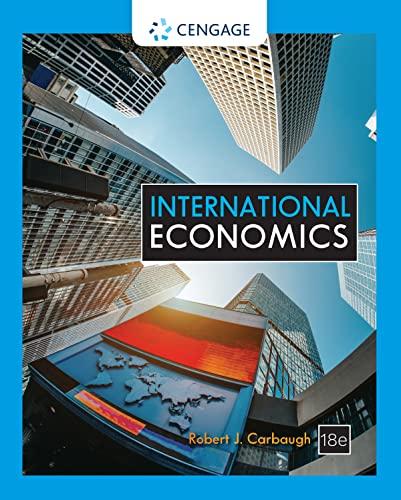For more than two centuries, many economists have advocated free trade among nations as the best trade
Question:
For more than two centuries, many economists have advocated free trade among nations as the best trade policy. Adam Smith and David Ricardo were pioneers of the argument for free trade. They maintained that, with specialization and trade, the world economy can attain a more efficient allocation of resources and a higher level of material well-being than it can without free trade. Let us briefly consider the lives and ideas of these two influential economists.
Adam Smith
Adam Smith (1723-1790) was born in Kirkcaldy, Scotland, where his widowed mother raised him. At age 14, he entered the University of Glasgow on scholarship and later enrolled at Oxford University, studying social philosophy. In 1751, he obtained a professorship at University of Glasgow, teaching moral philosophy. In his later life, Smith took a tutoring position that permitted him to travel throughout Europe, where he met and communicated with other intellectual leaders of his time. Smith is best known for two classic works: The Theory of Moral Sentiments (1759) and An Inquiry into the Nature and Causes of the Wealth of Nations (1776). He is widely regarded as the founder of modern economics and is among the most influential thinkers in the field of economics today.
Smith believed that free trade and a self-regulating economy foster social progress. He criticized the British government's tariffs and other restrictions on individual freedom in trade. Smith maintained that government need only maintain law and order, enforce justice, defend the nation, and provide for a few social needs that could not be provided by the market. One aspect of the English scene struck Smith. This was the substantial increase in productivity that resulted from the division and specialization of labor. Going into a pin factory, Smith saw a group of ten workers producing upward of 48,000 pins in a day as a result of specialization and the division of labor. He noted that if these workers had all worked separately and independently, they could not each of them produce 20 pins, perhaps not even one pin, in a day. Smith felt that the operation of a market system results in unity between private interests and social interests. Firms and suppliers of resources, desiring to fulfill their own self-interest and operating within the framework of a competitive market system, will simultaneously, as though led by an "invisible hand," foster the public or social interest. Nevertheless, he was skeptical of businessmen and warned of their conspiracy against the public to increase prices. He also warned that a business-dominated political system would permit a conspiracy of businesses against consumers. The Wealth of Nations went through five editions during Smith's lifetime, but it had minimal impact on economic policy until the early 1800s.
David Ricardo
David Ricardo (1772-1823) was the leading British economist of the early 1800s. He helped develop the theories of classical economics that emphasize economic freedom through free trade and competition. Ricardo was a successful businessman, financier, and speculator, and he accumulated a sizable fortune. Being the third of 17 children, Ricardo was born into a wealthy Jewish family. His father was a merchant banker.
They initially lived in the Netherlands and then moved to London. Having little formal education and never attending college, Ricardo went to work for his father at the age of 14. When he was 21, Ricardo married a Quaker despite his parents' preferences. After his family disinherited him for marrying outside the Jewish faith, Ricardo became a stockbroker and a loan broker. He was highly successful in business and was able to retire at 42, accumulating an estate that was worth more than $100 million in today's dollars. Upon retirement, Ricardo bought a country estate and established himself as a country gentleman.
In 1819, Ricardo purchased a seat in the British Parliament and held the post until the year of his death in 1823. As a member of Parliament, Ricardo advocated the repeal of the Corn Laws that established trade barriers to protect British landowners from foreign competition. However, he was unable to get Parliament to abolish the law at that time; it was not repealed until 1846. Ricardo's interest in economics was inspired by a chance reading of Adam Smith's The Wealth of Nations when he was in his late twenties. Upon the urging of his friends, Ricardo began writing newspaper articles on economic questions. In 1817, Ricardo published his groundbreaking The Principles of Political Economy and Taxation that laid out the theory of comparative advantage as discussed in this chapter. Like Adam Smith, Ricardo was an advocate of free trade and an opponent of protectionism. He believed that protectionism led countries toward economic stagnation.
However, Ricardo was less confident than Smith about the ability of a market economy's potential to benefit society. Instead, Ricardo felt that the economy tends to move toward a standstill. Yet Ricardo contended that if government meddled with the economy, the result would be only further economic stagnation. Ricardo's ideas have greatly affected other economists. His theory of comparative advantage has been a cornerstone of international trade theory for about 200 years and has influenced generations of economists in the belief that protectionism is bad for an economy.
What do you think? Compare the ideas of Adam Smith and David Ricardo regarding free trade and protectionism.
Step by Step Answer:






